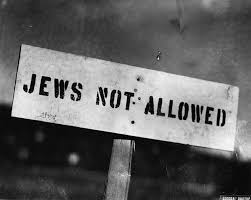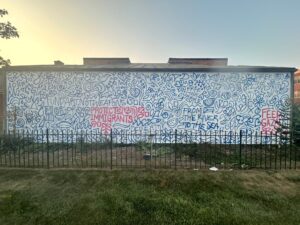
Marty Levine
August 14, 2025
If you noticed that the FBI recently released its data on Hate Crime for 2024 the FBI’s data for 2024 you saw it told us that there had been a significant rise in antisemitic incidents across the nation.
Here’s how the The ADL summarized this report through a Jewish lens:
Hate crimes against Jews increase 5.8 percent, closely mirroring ADL findings for 2024; highest ever recorded by FBI.
New York, NY, August 5, 2025 … Hate crimes data released today by the Federal Bureau of Investigation reveals that while reported hate crime incidents across the country decreased from 11,862 in 2023 to 11,679 in 2024, reported single-bias anti-Jewish hate crime incidents rose to 1,938 incidents, an increase of 5.8 percent from 2023, and the highest number ever recorded by the FBI since it began collecting data in 1991. These included 178 anti-Jewish assaults, up from 174 in 2023.
I wonder how you react to these numbers.
I am not sure what the data means. Does it describe events that target people because they are Jews or do they describe events that were about anti-Israel/pro-Palestinian protests?
In one case, because I am Jewish, I am the target; in the other, because I am actively protesting Israeli policies, I am the perpetrator.
What confounds me is how difficult it has become to agree on a definition of antisemitism; exactly what is IT? What is antisemitism?
A dictionary would seem to provide an easy answer:
an·ti-Sem·i·tism
/ˌanˌtīˈseməˌtizəm,ˌan(t)ēˈseməˌtizəm/
noun
noun: antisemitism
To many, that definition is not sufficient because it does not does not mention Israel.
For many years, I have looked at the data, particularly that collected and curated by the ADL, with skepticism. Their devotion to defending the actions of Israel, no matter how heinous they might be, and their energetic conflation of being pro-Palestinian (and/or anti-Zionist) with being antisemitic has made their data questionable. For them, and many in the pro-Israel tent, antisemitism has become the magic bullet to combat the increasing opposition to Israel.
That the land of Israel is a central element in our religious heritage is not what we disagree about. The history of the Jewish people we find in our Torah, as it is read every week, traces our roots back to the land as a promised inheritance and sees a rebuilt Temple as the symbol of a promised messianic age.
But the State of Israel, as created in 1948, was not that state. It was created as a political solution for rampant European Christianity-based antisemitism and for the horrific years of the Nazi Holocaust. The political entity was launched with a noble vision that belied its actual practices, a vision that was congruent to our American belief in democracy and equality.
THE STATE OF ISRAEL will be open for Jewish immigration and for the Ingathering of the Exiles; it will foster the development of the country for the benefit of all its inhabitants; it will be based on freedom, justice and peace as envisaged by the prophets of Israel; it will ensure complete equality of social and political rights to all its inhabitants irrespective of religion, race or sex; it will guarantee freedom of religion, conscience, language, education and culture; it will safeguard the Holy Places of all religions; and it will be faithful to the principles of the Charter of the United Nations.
Those words masked the expulsion of a resident population of Palestinians upon whose land the new Jewish state was being created. 750,000 Palestinian residents were forced out, and others were displaced internally. Those that remained were forced to live as non-citizens for years; once granted citizenship, they found it to be second-class.
Within the American Jewish Community that I grew up in, that history was hidden and replaced with a mythology of Israeli Jews bringing a modern nation out of an unoccupied desert. We were taught to believe that Israel was a model Democracy surrounded by a sea of hostile “Arabs” who wanted to erase it and its people.
When I began to see the reality of Israel, I could not help but recognize that the fear and pain that the Holocaust left behind made believing the fantasy of Israel comforting. If we didn’t have to confront the messy details a state built on a belief in Jewish supremacy, we would hold onto the power of Israel as the safe place for Jews who worried that the next pogrom was just around the corner. We could ignore the brutality of what Israel did in our name.
In this American reality, it is understandable that criticism of Israel and challenges to its right to exist as a Jewish nation may make some Jews uncomfortable. It may force them to rethink what they have been taught about what it means to be a Jew. Compare this to how white Americans have been asked to confront our nation’s history of slavery and racism.
But does that make this criticism antisemitic?
It only does if your goal is defending the State of Israel rather than protecting all Jews.
That makes interpreting what data like that collected by the FBI means. If it reflected what I would consider to be real antisemitic acts, it should be headlined and taken very seriously. So, I decided to look a little more deeply to see what I could find out about what the FBI was qualifying as antisemitic and if its standards differed from those of the ADL.
The data, in aggregate, is readily available and is easily downloaded. What you get are a series of spreadsheets that summarize the universe of hate crimes. The question remained: how did the various reporting police departments decide if an offense was antisemitic and a hate crime? With the data that the ADL collects, they provide examples and break their information out in a way that makes it easy to see how they are parsing events related to pro-Palestinian and anti-Israel protests and activities. The FBI doesn’t do that, and the individual reports that role up into the reported data are not available. So if you wanted to understand the 909 reported incidents of antisemitic intimidation or the 1518 reported cases of antisemitic vandalism, you cannot.
You cannot know if the hate crime is about a group of protestors with signs reading “long live the intifada” or about a person yelling “dirty kike.” Years of effort by pro-Israel voices to conflate issues of political action on behalf of Palestinian rights with acts of antisemitism have muddied the waters so that it is hard to know what the data means.
And this conflation is dangerous because it hides what is taking place across our country. It makes it more difficult to combat antisemitism. And that is dangerous for the Jewish community.
It provides a rationale for the right-wing forces that are now ascendant to attack the right to free speech and protest that are the bedrock upon which our American democracy has been built.
And that too It endangers because it provides cover to those for whom antisemitism is central to their political beliefs and who desire to make this nation a Christian nation, anation in which Jews must be second class if not eliminated.
Here’s how a prescient 2023 article from the Center on Terrorism, Extremism, and Counterterrorism describes this threat:
In recent years antisemitic conspiracy theories have played a significant factor in the large-scale radicalization of right-wing politics into outright fascism and religious nationalism, as well as contributing to the surge in militant accelerationism among the extreme right. With the rise of more overtly fascist worldviews from the political right, even the cynical “philosemitic” pretense of Christian Zionism has given way to the return of the explicit antisemitism that has defined the last two thousand years. As the Holocaust fades from living memory, the collective revulsion at its grisly horrors has been slowly eroded by the determined thrust of an assemblage of ethnic, racial, and religious nationalisms that constitute a major political force around the world. Thus, the crude and violent antisemitic invective of yesteryear returns with a fresh coat of paint in contemporary right-wing mass movements.
If we disagree about Israel/Palestine, let’s disagree about that. Hearing about a history that clashes with your own can be painful, but it doesn’t make the people putting forward that history haters. It should be a challenge to dig deeper and perhaps confront the possibility of being wrong. But don’t protect your discomfort by accusing those you disagree with of being haters, of being antisemites.
And don’t support the voices who wish to use our fears as cover behind which they can hide the real threat they pose to Jewish safety and to other endangered neighbors.
August 17: After publishing this, I came across a story about this preliminary work on a mural to be painted on a museum in Evanston…would you support destroying it as the Museum’s Board did?

